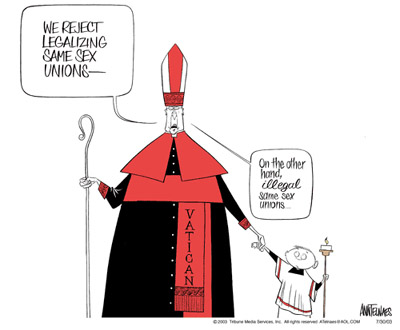If it were free market, I'd agree with you. But chiropractors use the powerful force of lobbying to convince a few bureaucrats (who may themselves believe in things like creationism) to force insurance companies to cover it, which forces me to pay for it through my premiums. That's not a free market choice, it's forced upon us by government.ussusimiel wrote:...in the case of something like chiropractic or homeopathy why not just trust people to decide for themselves. If something is obviously ineffective they will not continue with it. (It's ironic that I am using free market principles to bolster my position. I wonder if this some subtle ruse to convert me)
I've never viewed Dawkins as defensive, but he is a champion of a worldview that is largely under attack by mainstream society, so I can see how someone outside his worldview might interpret him that way. I think he views his role in society as reaching out to and supporting those who don't feel they can stand up for themselves, like atheist children of strictly religious parents, or women in Muslim countries. In fact, he has characterized himself this way in his book, The God Delusion. There aren't many societies were atheists can "come out" without great social friction, from their friends, family, church, community, etc. In the Bible Belt, we feel we must hide or downplay our beliefs to avoid alienating those around us. And that's a shame.
"Survival of the fittest" would include societies that care for their weaker members in need. That makes a society "fitter." Compassion is certainly a viable survival technique.ussusimiel wrote:I agree with your conclusion that if there is no afterlife (or beforelife) then imagining one is an illusion and a colossal waste of energy. However, a couple of points arise here. One is very practical: some people, for whatever reason, find bare existence unbearable and rather than face it they would prefer to kill themselves (and do). (To paraphrase Freud, too much reality can be bad for you.) Now a survival-of-the-fittest attitude might say 'good riddance', we're the stronger for it. However, a more compassionate view might hold that, in such a case, a bit of illusion is no bad thing. (Jung once told an alcoholic client that to be cured he needed to have a spiritual experience (which indirectly led to the formation of the AA).)
A certain amount of illusion is inevitable, and sometimes instructive, if for no other reason than to illuminate reality. In fact, reality may be something that we can ONLY approach through a succession of "tearing down illusion," a process which is never complete. That means reality is only ever glimpsed through a filter of illusion, and never "in itself."
However, I believe there is enough beauty in the world itself to combat
suicidal despair. I believe Donaldson has written six volumes of the Chronicles specifically to address that.
It might surprise you to learn that I've had many "spiritual" experiences myself, mainly on psychotropics. And I saw what I thought was an angel as a child. I understand the power of these experiences. And they were some of the most beautiful, awe-inspiring experiences I've ever had. However, none of them convinced me that there is a significant distinction between "spirit" and "mind." While I don't believe mind can simply be reduced to a pure materialistic explanation, I don't believe that it is entirely independent of matter. The former point leads people to believe in spirits, the latter point convinces others that even "mind" is an illusion. But I think the truth is somewhere in between, and we'll eventually find that we've thought too materialistically about matter.ussusimiel wrote:The other is more contentious: if existence just happens to hold realities that it is not possible to prove exist, then the more accurate image of reality is one that allows for that (weak argument, I know, but bear with me). In my case, my experience (and the experience of others) has led me to believe that I have a spirit that comes from another place. I feel that I have to accept this. If I denied or dismissed my experiences I would then occupy what, for me, would feel like an inauthentic place.
And I am more comfortable with a world that includes the idea of a spirit not simply because it gives me a strong sense of continued existence, but also because it makes a lot of human experience (past and present) understandable. There are a whole range of things that I do not now have to deny as existing (ghosts, ESP, psychics (like Don) etc.) and there are many stories and experiences that sane people tell me that I do not have to dismiss as delusion or wishful thinking.
u.




